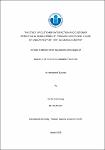| dc.description.abstract | Along with the rapid development of globalization and international economic integration, the freight forwarding industry in Vietnam also grows dramatically with the appearance of more and more logistics companies provide forwarding services in all maritime, railway, airway and roadway. Therefore, the competition in the service sector is also becoming intensively, forces many challenges for forwarders in finding and maintaining a stable market.
Currently, one of the business idiom is concerned in both research and practical economy is “customer is the king” and having more and more market power. Therefore, satisfying customer‟s needs becomes the guiding for success in every kind of business, especially in the service sector. The relationship among service quality, customer satisfaction and customer retention capability is referred in many researches. Toward customer satisfaction, besides some popular models like SERVEQUAL, SERVEPERF, a research model has also built to evaluate the relationship between maritime transport service quality and customer satisfaction but have not been widely used as a ROPMIS model of Thai Van Vinh (2008). Toward customer retention, although service satisfaction is widely confirmed as the most important factor predicting customer loyalty, there are different types of constraints, together with customer satisfaction, determine customer choice as switching barriers. According to the research of Jones et al. (2000, 2002), switching barriers includes switching costs, alternative attractiveness and interpersonal relationship which affect to customer retention capability of a company at different directions. From all of that, this paper want to discover more findings on those relationship by combine the academic theories of Thai Van Vinh (2008) and Jones et al. (2000,2002) to explore the relationship between service quality factors on consumer satisfaction as well as the
xiv
impacts of satisfaction and switching barriers on customer retention toward the marine freight forwarding service. In addition, the important level of each factors are also emphasize in the finding.
Because the limitation of time and cost, this study has just covered the issue in HCMC, at one company as Saigon Newport logistics company in one period of time (from Jun, 2014 to Dec, 2014).
By applying the triangulation approach which combines both quantitative and qualitative method, firstly, the data are collected through surveys and analyzed by SPSS, AMOS software. After that, in-depth interview is conducted later to confirm the results. The findings of the study will help SNP logistics company reviews their strategy to gain more customers satisfaction and stable market share in long-term period.
Although there still exists some limitations, the study is also proposed many applicable recommendation and suggestion to enhance SNP‟ marine freight service in particular as well as all other forwarders in general especially in Vietnam market. | en_US |


